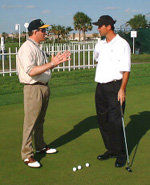
Focus on Your Skills, Not The Outcome
Do you trust your abilities to play your best golf under the stress and pressure of competitive rounds?
Do you trust your abilities to hit a successful recovery shot when needed or sink a long putt to save par?
Trust is an essential mental skill for golfers to play peak golf on a consistent basis.
Trust is not believing you should hit every shot perfectly. That is both perfectionist and unrealistic and will produce inconsistent and unpredictable results from shot to shot.
Trust is relying on your abilities and practice to perform successfully on the golf course.
In our Golf Mental Game Survey, a golfer asked the following question:
“When I’m with my swing coach I swing particularly well. When I get out and play with the guys, I get nervous and do not play well. How can I overcome that?”
This is a common scenario for golfers. You play better in practice rounds than competitive rounds. When you can’t seem to transfer your practice game to competitive rounds, frustration results.
You question your abilities, “What is wrong with me? I play great practice rounds the past few weeks and now I can’t even sink easy putts!”
Here’s the problem: You are focused on the results. You worry about your inability to swing the club freely. When you hit a bad shot, you expect similar results on the next hole. Your mind oscillates between past failures and fear of hitting bad shots in the future.
In contrast, when you are working with your swing coach, you are focused on hitting shots and not the result of the shot. You may have one swing thought in your mind, but you are not overthinking just before or during your swing.
If a shot veers off course, you are not overly concerned. You know there is another shot and know the next one will be a better one. You just move on and focus on the best play for the present shot.
This mindset is the essence of trust.
To bring the concept of trust into focus, look at the renewed mindset of PGA golfer Jordan Spieth. Spieth captured his first win in four years at the 2021 Valero Texas Open despite some shaky play at times.
Spieth commented on his mindset for the tournament and how he was able to maintain trust in his game.
SPIETH: “I really didn’t have great control of the ball this weekend at all. [In the past] I would have maybe started to freak out and change swing feels. Instead, I stuck to my guns and said ‘what I’m doing is the right thing, let’s just try and figure out what we’ve got.’ Do we have a shot that we can play? How are we going to step into this next one confidently?”
Building trust starts with repetition in practice and ingraining your mechanics through massive repetition.
The second part of trust is the ability to flip on your autopilot switch during competitive rounds. Autopilot is when you play golf without judging each swing and making changes mid-round.
You gain trust in your swing by focusing in the moment, keeping it simple on the golf course, and resisting overthinking and over-analyzing.
How to Trust in Your Golf Game:
Remind yourself that you don’t need to play perfect golf shots to shoot a good score. Your swing does not have to feel and look perfect to score well.
Your mindset for each shot should be “what’s my plan for this shot?” instead of what is at stake if I miss this shot.
Resist over controlling or steering your shots around the course to try to avoid mistakes or bogies–especially when you miss a couple shots and start searching and fixing.
Related Golf Psychology Articles
- Mental Techniques to Trust Your Swing
- How to Improve Trust in Your Golf Swing
- Trust in Your Swing to Improve Consistency in Golf
- Subscribe to The Golf Psychology Podcast on iTunes
- Subscribe to The Golf Psychology Podcast on Spotify
Golf Mental Coaching Programs

All golf psychology programs include the Golfer’s Mental Aptitude Assessment (GMAP), a custom Mental Game Plan, weekly coaching sessions, unlimited email correspondence, and The Golfer’s Mental Edge 2.0 workbook program.
One-on-one mental coaching is the fastest and most effective method to improve your mental game, boost your performance, and make lasting changes!
We have unique mental coaching programs, customized for you. Please contact us with any questions your have about our programs. Provide your name, email, and role below:
Or Call us today at 888-742-7225 | Mental Game Success Stories